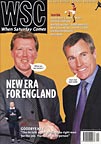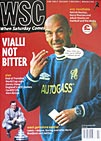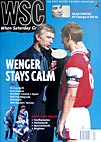 Sunday 1 Leicester are top for the first time since JFK was president after drawing with Sunderland – “We’re grinders,” says Peter Taylor – while Man Utd lose to a Thierry Henry “wonder goal”. “It was so spectacular. He’ll never do it again,” says Sir Alex, complimentary yet grudging. Chelsea recover from their midweek embarrassment to beat Liverpool 3-0. “I find it difficult to forgive international players when they make mistakes like we did today,” snaps Gérard.
Sunday 1 Leicester are top for the first time since JFK was president after drawing with Sunderland – “We’re grinders,” says Peter Taylor – while Man Utd lose to a Thierry Henry “wonder goal”. “It was so spectacular. He’ll never do it again,” says Sir Alex, complimentary yet grudging. Chelsea recover from their midweek embarrassment to beat Liverpool 3-0. “I find it difficult to forgive international players when they make mistakes like we did today,” snaps Gérard.
Search: 'Fan culture'
Stories
 The furore over Kevin Keegan's resignation masked deeper failures in the English game, says Stephen Wagg
The furore over Kevin Keegan's resignation masked deeper failures in the English game, says Stephen Wagg
Kevin Keegan’s resignation as England coach after the defeat by Germany on October 7 has to be seen as some kind of some kind of consummation. The ongoing melodrama that has been the England football team and its various administrations since the late 1960s had finally embraced the theatre of the absurd.
 David Stubbs reviews a musical… about football. Oh dear
David Stubbs reviews a musical… about football. Oh dear
Must admit, the prospect of an Andrew Lloyd-Webber-Ben Elton musical set in Troubles-ridden Northern Ireland about a local football team didn’t brace me. This is going to be bad, I thought. Groan-out-loud bad. Tear your programme into sweaty shreds and assume the foetal position bad.
 WSC’s almost annual roundtable brought together three contributors from different branches of the media to discuss trends in football reporting and a host of other relevant (and irrelevant) matters
WSC’s almost annual roundtable brought together three contributors from different branches of the media to discuss trends in football reporting and a host of other relevant (and irrelevant) matters
WSC It’s often said that players these days are remote from the fans. But has the attitude of players towards journalists also changed now that many of them are so phenomenally wealthy?
 Adam Crozier arrived at Lancaster Gate in January promising to usher in reform, if not revolution. The FA’s alarmingly young chief executive spoke to Mike Ticher about the FA Cup, the 2006 World Cup bid, the England team and other disasters he inherited
Adam Crozier arrived at Lancaster Gate in January promising to usher in reform, if not revolution. The FA’s alarmingly young chief executive spoke to Mike Ticher about the FA Cup, the 2006 World Cup bid, the England team and other disasters he inherited
Shortly after you were appointed you were quoted as saying the FA was “a bit of a shambles”. How did you find it when you arrived?
I think like everyone else I had a view from the outside on what the problems might be, but it was more of a shambles than I expected. The first 20 people I asked in the FA “What do you think you’re here to do?” I got 19 different answers. And I think that’s one reason why the FA was always so reactive, because people didn’t really understand what they were here for. The basic philosophy was, whatever you do, don’t cock up. And when you start from that point of view, the one thing that leads you to do is not make any decisions. From an organisational point of view people didn’t know who reported to who. People were doing jobs they weren’t qualified to do. So we reorganised Lancaster Gate from top to bottom and agreed a new three-year plan. We’ve got all the building blocks in place now and we’re ready to move on to the next stage.